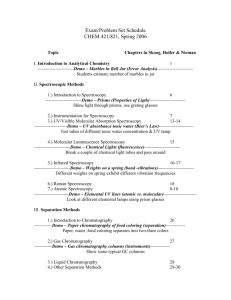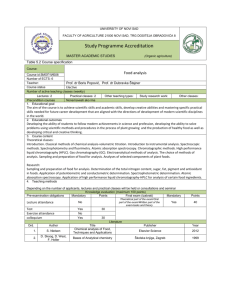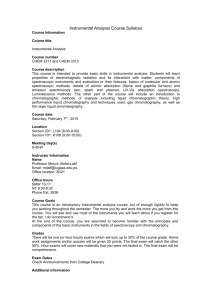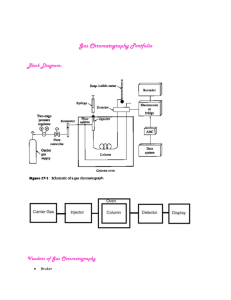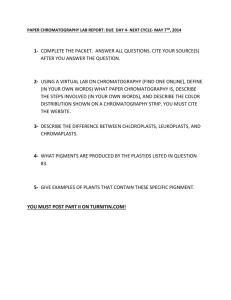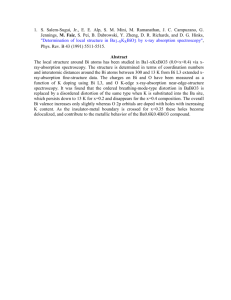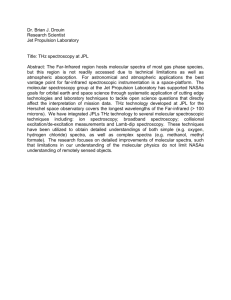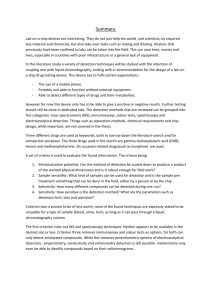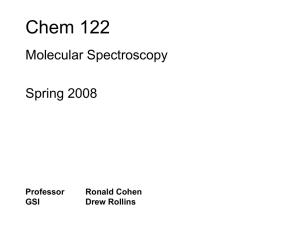PRINCIPLES AND TECHNIQUES OF BIOCHEMICAL
advertisement
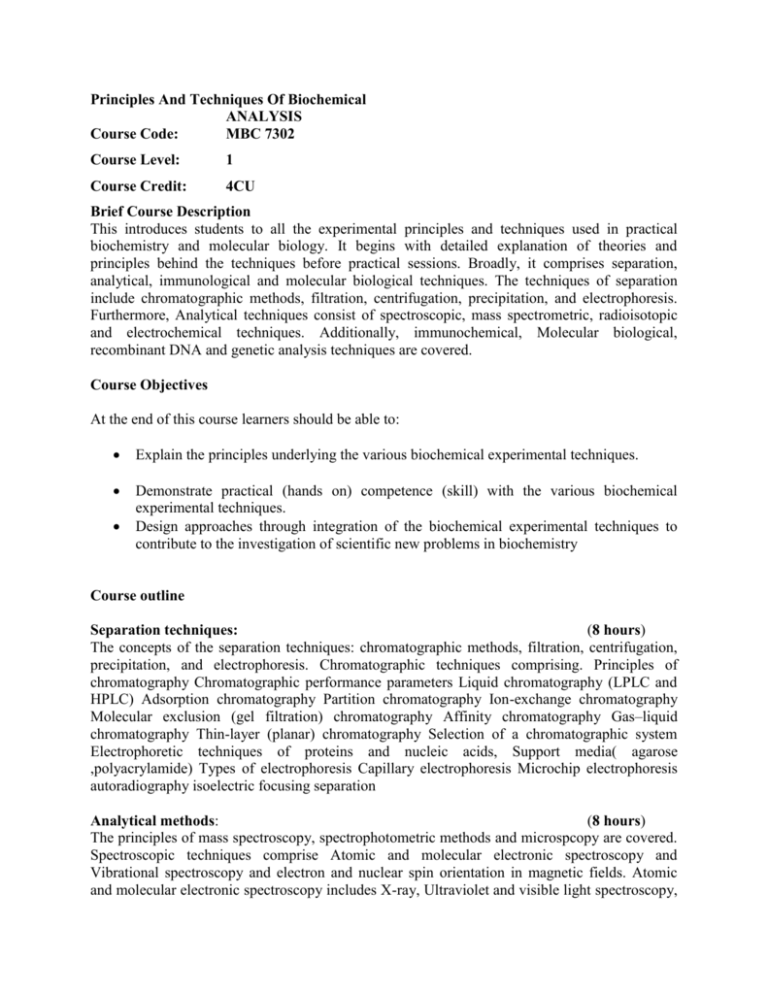
Principles And Techniques Of Biochemical ANALYSIS Course Code: MBC 7302 Course Level: 1 Course Credit: 4CU Brief Course Description This introduces students to all the experimental principles and techniques used in practical biochemistry and molecular biology. It begins with detailed explanation of theories and principles behind the techniques before practical sessions. Broadly, it comprises separation, analytical, immunological and molecular biological techniques. The techniques of separation include chromatographic methods, filtration, centrifugation, precipitation, and electrophoresis. Furthermore, Analytical techniques consist of spectroscopic, mass spectrometric, radioisotopic and electrochemical techniques. Additionally, immunochemical, Molecular biological, recombinant DNA and genetic analysis techniques are covered. Course Objectives At the end of this course learners should be able to: Explain the principles underlying the various biochemical experimental techniques. Demonstrate practical (hands on) competence (skill) with the various biochemical experimental techniques. Design approaches through integration of the biochemical experimental techniques to contribute to the investigation of scientific new problems in biochemistry Course outline Separation techniques: (8 hours) The concepts of the separation techniques: chromatographic methods, filtration, centrifugation, precipitation, and electrophoresis. Chromatographic techniques comprising. Principles of chromatography Chromatographic performance parameters Liquid chromatography (LPLC and HPLC) Adsorption chromatography Partition chromatography Ion-exchange chromatography Molecular exclusion (gel filtration) chromatography Affinity chromatography Gas–liquid chromatography Thin-layer (planar) chromatography Selection of a chromatographic system Electrophoretic techniques of proteins and nucleic acids, Support media( agarose ,polyacrylamide) Types of electrophoresis Capillary electrophoresis Microchip electrophoresis autoradiography isoelectric focusing separation Analytical methods: (8 hours) The principles of mass spectroscopy, spectrophotometric methods and microspcopy are covered. Spectroscopic techniques comprise Atomic and molecular electronic spectroscopy and Vibrational spectroscopy and electron and nuclear spin orientation in magnetic fields. Atomic and molecular electronic spectroscopy includes X-ray, Ultraviolet and visible light spectroscopy, Spectrofluorimetry, Circular dichoursoism, Turbidimetry nephelometry luminometry and atomic spectroscopy Lasers. Vibrational spectroscopy and electron and nuclear spin orientation in magnetic fields consists of Infrared and Raman spectroscopy Electron spin resonance spectroscopy, Nuclear magnetic resonance spectroscopy. Mass spectrometric techniques comprise Ionisation, Mass analysers, Detectors, Structural information by tandem mass spectrometry Analysing protein complexes. Microscopy principles behind light, electron, phasecontrast and other microscopes are covered. Specialised imaging techniques including Image archiving, presentation, Optical-sectioning Imaging living cells and tissues are covered. Immunological techniques: (7 hours) The principles and techniques concerning production of mono- and polyclonal antibodies, purification and fragmentation of immunoglobulins , Affinity and avidity Labeling of antibodies and various immunoassays are covered. Immunoassays including ELISA’s(sandwich et.c) Immunoprecipitation,Immunofluorescence assays (IFA), Immunochemical use of surface plasmon resonance , immunoelectrophoresis(1D and 2D ) , Western blotting, flow cytometry , radioimmunology, Immunohistology, immunosorption.. and dot immunobinding assay. Immobilization of antibodies, and immunohistochemistry, image processing Protein A, T-gel, HOURSP, biotin-avidin are covered Molecular biology, recombinant DNA and genetic analysis (7 hours) The manipulation of nucleic acids: basic tools and techniques: Isolation and separation of nucleic acids, molecular biology and bioinformatics, Molecular analysis of nucleic acid sequences, The polymerase chain reaction (PCR), Northern Blotting, Southern Blotting, RFLPs. Nucleotide sequencing of DNA, Constructing gene libraries, Cloning vectors, Hybridisation and gene probes. Screening gene libraries, Applications of gene cloning, Expression of foreign genes. Analysing genes and gene expression, Pharmacogenomics. Analysing whole genomes Tutorials (20 hours) Practicals (40 hours) Mode of course delivery This course will be conducted in three main ways involving Formal Lectures, Practical sessions, Coursework, and Presentations. Assessment Assessment will be by examination, tests, assignments reports, and presentations. Their relative contribution to the final grade is shown below: Requirement Progressive (Practicals and assignments) Tests Final examination Total Reading List Contribution 20 % 20 % 60 % 100 % 1. - Keith Wilson and John Walker (2000) Principles and Techniques of Practical Biochemistry, Fifth Edition, Cambridge University. 2. John F. Robyt and Bernard J. White (1990) Biochemical Techniques: Theory and Practice Waveland Press 3. Keith Wilson and John Walker (1999)6th Edition Principles and Techniques of Biochemistry and Molecular Biology, Cambridge University Press 4 Alfred Pingoud , Claus Urbanke , Jim Hoggett ,Albert Jeltsch (2002)Biochemical Methods: A Concise Guide for Students and Researchers Wiley-VCH Elective Courses: The course requires the completion of one elective course from the following four choices. Students then proceed to develop a research project in a specialty within this field.
